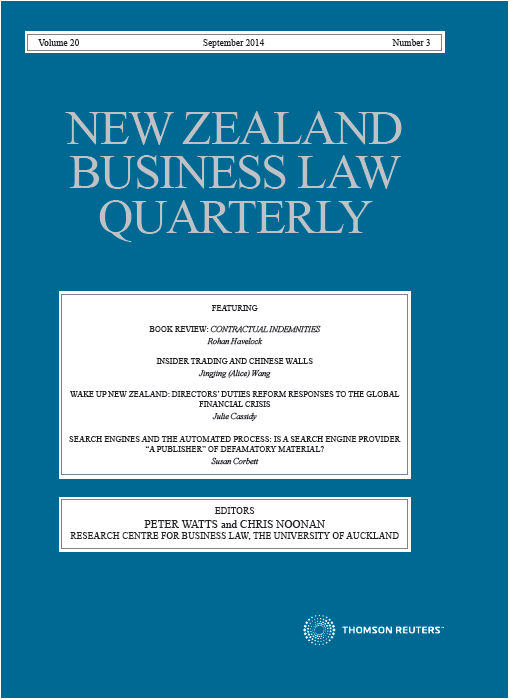New Zealand Business Law Quarterly Update
The New Zealand Business Law Quarterly (NZBLQ) Volume 20 Number 3, September 2014 has recently been released.
It contains four articles. Their titles, authors, and either an abstract or an extract from each, are below.
1. Book review by ROHAN HAVELOCK (BA LLB (Hons) LLM (Cantab), Senior Lecturer, Faculty of Law, University of Auckland, and Barrister and Solicitor of the High Court of New Zealand) of Contractual Indemnities by Dr Wayne Courtney (Hart Publishing, Oxford, 2014)
Review extract:
“…this is a scholarly text which covers in meticulous detail the full range of issues associated with indemnities: not simply the technical issues of their nature and their construction, but also the more practical issues of their breach and enforcement. The author fulfils the stated aim “to provide a coherent account of the construction and enforcement of promises of indemnity”. This is a valuable and landmark work which should be of immense assistance to commercial practitioners, litigators and judges alike when confronted by indemnity problems.”
2. Insider Trading and Chinese Walls by JINGJING (ALICE) WANG BA/LLB (Hons), University of Auckland; MSc candidate, University of Oxford
Article Abstract:
“Chinese walls are recognised in New Zealand as one of five statutory defences to the prohibition of insider trading. However, limited guidance has been offered as to what arrangements would satisfy application of the defence. This article examines the rationale, efficacy and legal implications of “Chinese walls” in relation to participation in the securities market and offers some criteria as to what a successful arrangement may require.”
3. Wake up New Zealand: Directors’ Duties Reform Responses to the Global Financial Crisis by JULIE CASSIDY Professor of Law, Auckland University of Technology; Fellow of the Taxation Law and Policy Research Institute, Monash University
Article Abstract:
“This article considers recent measures to criminalise serious breaches of two directors’ duties, namely s 131 of the Companies Act 1993 (the duty of act in good faith and in the best interests of the company) and s 135 of the Act (reckless/insolvent trading). The Companies Amendment Act 2014 introduces two new offences contained in ss 138A and 380(4) of the principal Act. Under s 138A(1) criminal liability will follow for a breach of the duty to act in good faith when the director acts in “bad faith”, “believing that the conduct is not in the best interests of the company” and “knowing” that the conduct will cause “serious loss to the company”. Under s 380(4) criminal liability for reckless/insolvent trading will arise when the director “knows” that the company is insolvent or that the debt will render the company insolvent and the failure to prevent the company incurring the debt is “dishonest”. The director will in turn face the penalties set out in s 373(4) of the Act, namely five years imprisonment or a fine of up to $200,000. In addition, as a breach of these duties will now constitute an offence, the automatic ban from management for five years under s 382 of the Act will apply. Ultimately, it is submitted, that while the changes are to be applauded, they do not go far enough. In particular it is suggested that criminal breaches should not be confined to these two directors’ duties. The article also suggests these changes would be complemented by the introduction of a civil penalty regime as in Australia. To date this has been rejected by the New Zealand reform bodies. However, the author suggests reconsideration is warranted as this would provide the Financial Markets Authority with another useful weapon in its armoury, particularly when breaches are not serious enough to attract criminal liability.”
4. Search Engines and the Automated Process: Is a Search Engine Provider “a Publisher” of Defamatory Material? by SUSAN CORBETT Associate Professor, School of Accounting and Commercial Law, Victoria University of Wellington
Article Abstract:
“Is the search engine provider a “publisher” in defamation law if the results of an online search include snippets of defamatory material and links to defamatory comments on a third party’s website? Although guiding principles are emerging from international decisions in regard to the potential liability of other internet intermediaries for publishing defamatory material, the liability of a search engine provider remains uncertain. In essence, this is because the search engine provider argues that its results are entirely produced by an automated process. The article refutes this argument. It suggests that in most instances a search engine provider that provides links to defamatory material is liable as a publisher. However, the article also proposes that a search engine provider may have the defence of innocent dissemination available to it, providing it can show that it has not been negligent. One way of demonstrating this would be for the search engine provider to make use of text analysis technologies to filter out potentially defamatory materials from its search results.”
About NZBLQ
The New Zealand Business Law Quarterly (NZBLQ) is New Zealand's leading business law journal. It is a joint venture between the Research Centre for Business Law at The University of Auckland and Thomson Reuters NZ. The NZBLQ aims to provide in-depth, but accessible, analyses of business law issues for both a national and international legal audience. It is a fully refereed journal, with material submitted by academics, from New Zealand and abroad, and by practising lawyers. Published four times per year, it is available in hard copy and online.
For more information
- Visit our estore: New Zealand Business Law Quarterly (NZBLQ)
- Or talk to your account manager or call Customer Service 0800 10 60 60